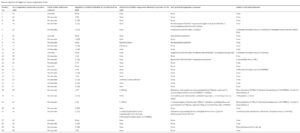
Click to Enlarge: a. The number of analyzable ingredients differs from the number of ingredients presented on the product label due to the instrumentation limits for analysis. Elements including zinc, selenium, calcium, chromium, manganese, magnesium, potassium, sodium, and so forth are not able to be analyzed as well as fat soluble vitamins, including Vitamin D3. b. Ingredient appeared on label. c. Ingredient did not appear on label. Source: JAMA Network Open
BETHESDA, MD — Dietary supplements for weight loss are widely promoted online and through social media, with many claiming to have the added benefits of building lean muscle and enhancing energy and performance. While many companies market such supplements to the military with special discounts, a new study suggests why servicemembers, in particular, should use caution when purchasing weight-loss aids.
The study, led by researchers at the Uniformed Services University, found that many such products contain unlisted ingredients. Some of them could not only cause harm but could potentially open servicemembers to prosecution and jeopardize their military careers.
To better understand the contents and potential dangers of such supplements, researchers randomly selected 30 dietary supplements from 12 online companies advertising military discounts to analyze.1
Liquid chromatography-mass spectrometry was used to verify the accuracy of product labeling in accordance with the Supplement Facts listed ingredients and to check for any substances listed on the DoD Prohibited Dietary Supplement Ingredients List. Health.mil, the official website of the Military Health System, urges members of the military who are considering taking a dietary supplement to check the list “to reduce the potential risk to your health and career.”
Additionally, a separate analysis was performed to evaluate product label claims using the Operation Supplement Safety (OPSS) Risk Assessment Scorecard, a tool the DoD created to assist consumers in screening their supplements for safety.
Their analyses, reported in JAMA Network Open, revealed that 25 out of the 30 products tested for quality had inaccurate labels: 24 contained ingredients listed on the label that were not detected in the product (misbranded), seven had hidden components not disclosed on the label, and 10 contained ingredients from the DoD Prohibited List, either listed or undisclosed.
Prohibited ingredients confirmed through product testing ranged from one to seven from any single product and consisted of the following:
- 2-aminoisoheptane HCl (DMHA)
- DMAA
- acacia rigidula
- ephedra extract listed on labels but detected as ephedrine, methylephedrine and pseudoephedrine, higenamine, hordenine, isopropylnorsynephrine, methylsynephrine, octopamine and vinpocetine
- 7-[2-hydroxy-3-(2-hydroxyethyl-methylamino)propyl]-1,3-dimethylpurine-2,6-dione, known as Xanthinol
The analysis found nine products contained stimulants of phenethylamine and its derivatives, prohibited in sport according to the World Anti-Doping Agency (WADA) including: β-phenylethylamine HCl (β-PEA), N-phenethyl dimethyl amine (N, N-DMPEA, N, N -dimethylphenylethylamine), and N-methyl-β-phenethylamine. Seven products had ingredients on both the DoD Prohibited List and the WADA List (S6 stimulants), with two to 10 of these ingredients in any one of the seven products.
Multiple Stimulants
“Of concern was the fact that most of the products contained multiple ingredients, and multiple combinations with stimulant effects,” the researchers wrote. “It is unknown how these stimulant and other ingredients interact with each other, not to mention current use of over-the-counter and/or prescription medications or additional dietary supplement products.”
Also, some products listed herbal/botanical extracts containing compounds such as methylsynephrine, N-methyl-β-phenylethylamine, N,N-dimethylphenylethylamine, where the plant authenticity could not be verified, according to the study. “In fact, adulteration of botanicals to boost profits has occurred with unintentional or intentional substitution or dilution with undisclosed lower-cost ingredients,” the authors pointed out. “These issues present clear health risks for all consumers.”
All products were rated as risky, according to the OPSS Scorecard. Additionally, none of the products had an independent, third-party certification seal on the label to indicate they had been tested by an independent laboratory for quality and/or contaminants, such as BSCG Certified Drug Free, NSF Certified Sport, LGC’s Informed Sport or USP (United States Pharmacopeia), according to the study. Fourteen of the products had a Good Manufacturing Practice (GMP) seal or GMP text on their label.
Fourteen of the products had a Good Manufacturing Practice (GMP) seal or GMP text on their product label. GMP is a Food and Drug Administration requirement, but such seals should not be mistaken as indications of safety, quality, or federal approval,” the authors wrote. “Still other products had seals stating ‘tested for purity’ or ‘lab tested,’ but not associated with any known independent, third-party organization.”
“These findings suggest that predatory marketing and low quality of weight loss supplements pose a threat to military members and the public,” the researchers concluded.
- Crawford, C., Avula, B., Lindsey, A. T., Katragunta, K., Khan, I. A., & Deuster, P. A. (2024). Label Accuracy of Weight Loss Dietary Supplements Marketed Online With Military Discounts. JAMA Network Open, 7(5), e249131. https://doi.org/10.1001/jamanetworkopen.2024.9131

